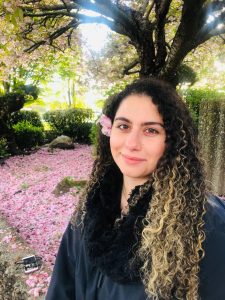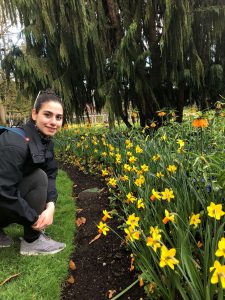
Hello! My name is Saba, and I am a fifth-year Biology student. I am ethnically from Iran but spent the majority of my time growing up in Dubai before moving to Vancouver in 2017. Recently, I joined the Biological Sciences Society Club for the academic term of 2023-2024. As the academic director of the club, my duties include preparing exam packages and hosting midterm reviews for BIOL 234. Additionally, during the summer, I worked on a research project as part of the ongoing research in the Milsom lab. Currently, I am volunteering as an optometrist intern at Eyelab, and also at Louis Brier Hospital.
What are you researching?
My research investigated the effect of 24 hours of hypoxia on body temperature, metabolism, and respiratory frequency in adult 13-lined ground squirrels (Ictidomys tridecemlineatus). It has been found that 13-lined ground squirrels are able to withstand extended periods of reduced oxygen and these small mammals engaged in torpor as a response. A previous study on the same species found that after 24 hours of sustained hypoxia, metabolic rate stabilized, body temperature continued to drop, and breathing frequency remained elevated. My study hypothesized that oxygen demand will reduce upon being exposed to hypoxia and will lead to physiological changes, with metabolic rate and breathing frequency initially dropping below normoxic levels, while body temperature drops further before eventually recovering and stabilizing.
Why is this research important?
Investigating how animals like ground squirrels adapt to hypoxic conditions provides insights into the physiological mechanisms they employ to survive in low-oxygen environments. This knowledge can contribute to our understanding of evolutionary adaptations and may have implications for human health, particularly in contexts such as high-altitude living or medical conditions involving hypoxia. Similarly, understanding how animals respond to environmental challenges like hypoxia can inform conservation efforts, especially in light of ongoing environmental changes such as climate change and habitat loss. Insights gained from studies on hypoxia tolerance can help predict how species might respond to altered oxygen levels in their habitats.
What do you most enjoy about doing research?
I enjoyed working with squirrels and learning more about them. I found it fascinating how their bodies responded to prolonged periods of hypoxia and how quickly they recovered from it. Additionally, I also enjoyed the time I spent with my supervisor as we delved into animal physiology and compared the results of my study to other studies.
What advice would you give to other students considering doing a research project?
I highly recommend that students enroll in the directed studies course as it offers them the opportunity to gain hands-on experience, connect with professionals in the field, and understand the process of conducting research and publishing papers. The latter aspect is particularly beneficial for students aiming to pursue a master’s in research, as this experience will enable them to grasp the intricacies of research on a smaller scale before embarking on the program.
What do you like to do in your spare time?
 I like to swim and play badminton in my spare time. I also love going on long walks, watching sunsets, and taking photos of them. I engage in photography on a regular basis, and the main themes I am interested in are animals, flora, and sunsets.
I like to swim and play badminton in my spare time. I also love going on long walks, watching sunsets, and taking photos of them. I engage in photography on a regular basis, and the main themes I am interested in are animals, flora, and sunsets.
What is a fun fact about you that people may not know?
I have four cats, and back in Dubai, I was an active member of the Stray Animal Society, helping stray cats find loving homes whilst also getting vaccinated and neutered/spayed.
What are your plans following graduation?
I aspire to become a physical therapist specializing in sports physical therapy. Recently, I have developed an interest in obtaining a specialization in animal physical therapy as well. In this field, I aim to promote rehabilitation, recovery, and well-being in animals that have suffered injuries, undergone surgeries, or experienced illnesses.
What is something you’ve done at UBC that you’ve found valuable?
An experience that I will always cherish was my role as a peer tutor for BIOL 111 over two terms. During this time, I formed connections with students, supported professors Dr. Milsom and Dr. Ellis during lectures, and fielded inquiries on topics ranging from course content to broader biology concepts as an upper-level student. I enjoyed the experience as I could see myself in the students, especially those in their first year, and empathized with them as they stressed over coursework or felt confused at times. I appreciated the opportunity to hold their hands through this step and assure them that it gets better as they progress through the academic years.